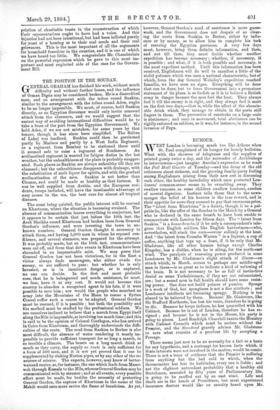THE POSITION IN THE SOUDAN.
GENERAL GRAHAM has finished his work, without much difficulty and without further losses, and the influence of Osman Digna may be considered broken. He is a discredited man, and an arrangement with the tribes round Suakim, similar to the arrangement with the tribes round Aden, ought to be no longer impossible. We must, of course, hold Suakim directly, as an Egyptian Governor would only invite renewed attack from the clansmen, and we would suggest that the easiest way of avoiding international difficulties would be to take a lease of the port from the Egyptian Government. We held Aden, if we are not mistaken, for some years by that tenure, though it has since been simplified. The Sultan of Lahej was landlord. Suakim could then be garrisoned partly by Marines and partly by a West India Regiment, or a regiment from Bombay to be stationed there until
it seemed safe to raise a regiment of Soudanese. An acclimatised regiment is wanted for fatigue duties in the hot weather, but the unhealthiness of the place is probably exagger- ated. Such places as Suakim are always unhealthy till they are cleansed ; but the unhealthiness disappears with drainage, with the substitution of malt liquor for spirits, and with the gradual acclimatisation of the men. Suakim is not hotter than Chunar, and could be made as healthy as that fortress. It can be well supplied from Arabia, and the European resi- dents, troops included, will have the inestimable advantage of easy access to the sea, the best cure for almost all tropical diseases.
The coast being quieted, the public interest will be centred on Khartoum, where the situation is becoming strained. The absence of communication leaves everything to conjecture, but it appears to be certain that just before the 10th inst. the Arab Sheikhs round Khartoum had broken loose from General Gordon's influence, and were investing the town in un- known numbers. General Gordon thought it necessary to attack them, and having 5,000 men in whom he reposed con- fidence, and several steamers, was prepared for the attempt. It was probably made, but on the 10th inst. communications were cut off, and from that date events in Khartoum have been shrouded in an impenetrable mist. We may guess that General Gordon has not been victorious, for in the East a victor always finds messengers, who either evade the enemy, or are suffered to pass ; but whether he is only invested, or is in imminent danger, or is captured, no one can decide. In the first and most probable case, that he is beleaguered and needs assistance, he must, we fear, have it at any cost. It would not become this country to abandon a recognised agent to his fate, if it were possible to save him ; nor would the people who marched an army into the Mountains of the Moon to rescue a Syrian Consul suffer such a course to be adopted. General Gordon must be rescued, if it is possible ; but both the possibility and the method must be studied by the professional soldiers. We are ourselves inclined to believe that a march from Egypt itself along the Nile is impossible, as involving too much time; and this is said to be the opinion of Colonel Coetlogon, who has arrived in Cairo from Khartoum, and thoroughly understands the diffi- culties of the route. The road from Suakim to Berber is also most difficult, the absence of water rendering it nearly im- possible to provide sufficient transport for so long a march, in so terrible a climate. The beasts on a long march drink as much as they carry, the supply en route is only sufficient for a force of 500 men, and it is not yet proved that it can be supplemented by sinking Norton pipes, or by any other of the re- sources of science. The experts, however, may know of better- watered routes, as, for instance, the one which leads from Masao- wah through Kassala to the Nile, whence General Gordon may be communicated with by steamer ; and at all events, every possible effort must be made, for besides the necessity of protecting General Gordon, the capture of Khartoum in the name of the Mahdi would once more revive the flame of fanaticism. As yet, however, General Gordon's need of assistance is mere guess- work, and the Government does not despair of so clear- ing the route from Suakim to Berber, either by influ- ence or by money, as to allow him to complete his task of rescuing the Egyptian garrisons. A very few days must, however, bring them definite information, and then, and not till then, they must decide whether another expedition has become necessary ; whether, if necessary, it is possible ; and what, if it is both possible and necessary, is the most expedient method. Until this information has been received, Englishmen will do well to manifest a little of the stolid patience which was once a national characteristic, but of which, from the day General Wolseley's expedition reached Ismailia, we have seen no signs. Everything will be done that can be done, but to force Government into a premature statement of its plans, is as foolish as it is to believe a British army in danger because the men feel the heat. They always feel it till the enemy is in sight, and they always feel it most on the first two days,—that is, while the effect of the abomin- able drink which they manage to obtain in the ports still lingers in them. The preventive of sunstroke on a large scale is abstinence ; and once in movement, total abstinence can be rigidly enforced on soldiers, as it was, for instance, in the second invasion of Pegu.


































 Previous page
Previous page